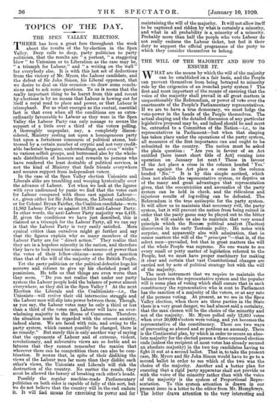TOPICS OF THE DAY.
THE SPEN VALLEY ELECTION. THERE has been a great fuss throughout the week about the results of the by-election in the Spen Valley. Deep calls to deep, party politician to party c politician, that the results are a portent, "a staggering blow" to Unionism or to Liberalism as the case may be, "a triumph for Labour," and "a writing on the wall" for everybody else. It is with this lest set of deductions from the victory of Mr. Myers, the Labour candidate, and the defeat of Sir John Simon, his Liberal opponent, that we desire to deal on this occasion—to draw some conclu- sions and, to ask some questions. To us it seems that the really important thing to be learnt from this and recent by-elections is by no means that Labour is hewing out for Itself a royal road to place and power, or that Labour is triumphant. For us what emerges as the central, essential fact is that even when all the conditions are as extra- ordinarily favourable to Labour as they were in the Spen Valley the Labour Party can only manage to secure the support of a little over a third of the voters polling. A thoroughly unpopular, nay, a completely &aeon- sidered, Ministry resting not upon a homogeneous party but upon a fortuitous concourse of political atoms, but- tressed by a certain number of cryptic and not very credit- able backstair bargains, understandings, and even winks" to various selfish groups, and buttressed also by the whole- sale distribution of honours and rewards to persons who have rendered the least desirable of political services, is not the kind of Ministry that finds friends everywhere and secures support from independent voters.
In the case of the Spen Valley election Unionists and Liberals alike are trembling and weeping hysterically over the advance of Labour. Yet when we look at the figures with eyes undimmed by panic we find that the votes cast for Labour compared with those cast against Labour- i.e., given either for Sir John Simon, the Liberal candidate, or for Colonel Bryan Fairfax, the Coalition candidate—were 11,962 Labour Party as against 18,378 anti-Labour Party. In other words, the anti-Labour Party majority was 6,416. If, given the conditions we have just described, this is claimed as a triumph for the Labour Party, all we can say is that the Labour Party is very easily satisfied. More cynical critics than ourselves might go further and say that the figures explain why so many members of the Labour Party are for "direct action." They realize that they are in.a hopeless minority in the nation, and therefore they have to look round for some other source of power than the votes of their fellow-citizens—some other sanction than that of the will of the majority of the British People.
Yet the. party politician or the political defeatist hugs his sorrows and refuses to give up his cherished pearl of pessimism. He tells us that things are even worse than they seem. "Do you not realize that under our party system the Labour people hold the balance of power almost everywhere, as they did in the Spen Valley ? At the next Election the Liberals and the Coalitionists—i.e., the Unionists—will revive their old internecine struggle and the Labour men will slip into power between them. Though, as you say, the Labour votes may be only a third or less than a third of the votes case, Labour will have an over- whelming majority in the House of Commons. Therefore the situation must be regarded with the utmost anxiety, indeed alarm. We are faced with ruin, and owing to the party system, which `cannot possibly be changed, there is no remedy." But surely this is only another way of saying that the opponents of Labour and of extreme, violent, revolutionary, and subversive views are so feeble and so fatuous that they cannot remember the maxim that wherever there can be competition there can also be com- bination. It means that, in spite of their disliking the views of the Labour men far more than they dislike each other's views, the Unionists and Liberals will risk the destruction of the country. No matter the result, they must be allowed the luxury of breaking each other's heads.
Possibly the regular machine-made Parliamentary politician on both sides is capable of folly of this sort, but we do not believe that the country will in the end endure it. It will find means for exercising its power and for maintaining the will of the majority. It will not allow itself to be captured and ridden by what is certainly a minority, and what in all probability is a, minority of a minority. Probably more than half the people who vote Labour do not really endorse the Labour ticket, but feel it their duty to support the official programme of the party to which they consider themselves to belong.


































 Previous page
Previous page